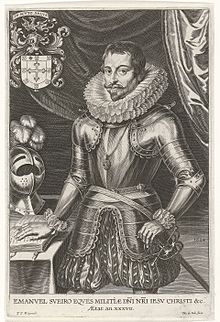Emanuel Sueyro
Appearance
Emanuel Sueyro | |
|---|---|
 Emanuel Sueyro in his 37th year, engraved by Pieter de Jode I after Peter Paul Rubens, 1624 | |
| Born | February 20, 1587 Antwerp, Duchy of Brabant, Spanish Netherlands |
| Died | 1629 (aged 41–42) Brussels, Duchy of Brabant, Spanish Netherlands |
| Occupation | spymaster |
| Language | Spanish |
| Period | Baroque |
| Genre | history |
| Notable works | Anales de Flandes (1624) |
Emanuel Sueyro (1587–1629), Lord of Voorde, Knight of Christ, was an intelligence agent and historian in the 17th-century Habsburg Netherlands.
Life
Of Portuguese descent, Emanuel Sueyro was born and brought up in Antwerp.[1] He translated classical and more recent Latin histories into Spanish, and wrote a two-part history of the Low Countries, Anales de Flandes (1624).
He was head of a secret intelligence network in the Habsburg Netherlands, reporting to Philip III of Spain.[2] For this work he was awarded a knightship in the Order of Christ. He was lord of Voorde by purchase.
Writings
Histories
- Descripcion breve del pais baxo (Antwerp, Gerard Wolsschaten, 1622)
- Anales de Flandes (Antwerp, Peter and Jan Bellerus, 1624), dedicated to Philip IV of Spain
Translations
- Tacitus, Las obras de C. Cornelio Tacito (Antwerp, heirs of Peter Bellerus, 1613), dedicated to Isabel Clara Eugenia
- Sallust, Obras de Caio Crispo Sallustio (Antwerp, G. Wolsschaten & H. Aerts for Jan Van Keerbergen, 1615), dedicated to Don Juan de Mendoza, Duke of the Infantado
- Herman Hugo, Sitio de Breda rendida a las armas del rey don Phelipe IV (Antwerp, Plantin office, 1627), dedicated to Ambrogio Spinola
References
- ^ V. Fris, "Sueyro (Emanuel)", Biographie Nationale de Belgique, vol. 24 (Brussels, 1929), 253
- ^ J.J. Poelhekke, Het verraad van de pistoletten? (Verhandelingen der Koninklijke Nederlandse Akademie van Wetenschappen, Afd. Letterkunde, new series 88; Amsterdam, 1975) ISBN 0720482836
External links
- Translation of Tacitus (1613), at Google Books.
- Translation of Sallust (1615), at Google Books.
- Anales de Flandes part 1 (1624), at Google Books.
- Anales de Flandes, part 2 (1624) at Google Books.
- Sitio de Breda (1627) at Google Books.
